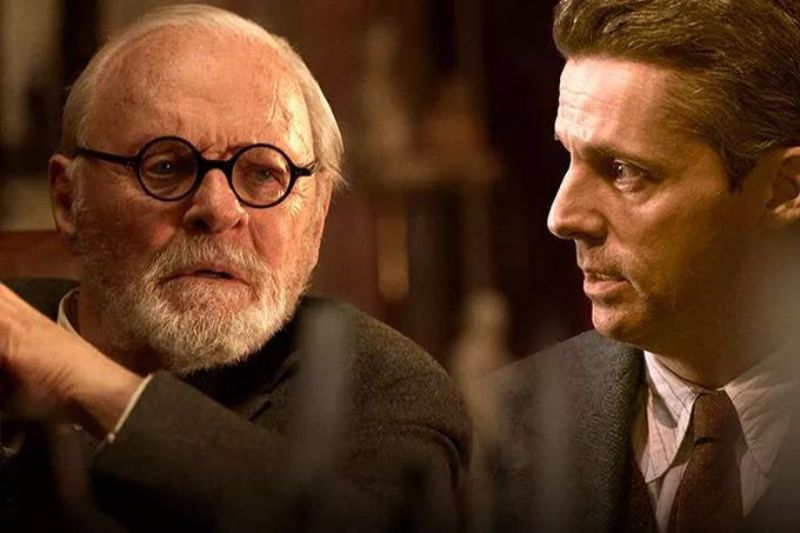The imaginary pairing of famous historical figures in art is not new. In 1993, Steve Martin surprised many with the play Picasso at the Lapin Agile, which portrayed a fictional meeting between Einstein and Picasso, just before their major discoveries. Released this week, Freud’s Last Session is based on a play which in turn was based on Armond Nicholi’s 2002 book The Question of God. It pits the famous psychoanalyst Sigmund Freud against Christian apologist and author C.S. Lewis.

It’s a powerful concept, given the sheer cultural heft of the two historical figures. Freud’s Jewish background gave way to an atheistic identity in adulthood, although it contributed to some of his early ideas regarding personality development. By contrast, C.S. Lewis started as an avowed atheist, and progressively found himself unable to challenge the nonexistence of God, eventually becoming the celebrated author of several Christian works, including children’s classic The Lion, The Witch and the Wardrobe.
The play was one long conversation between the eponymous figures and the film develops that story further, particularly with the inclusion of Freud’s daughter Anna. Interestingly however, whilst the play made it clear that Freud was unusually dependent on his daughter, the film depicts the reverse, together with the challenging aftermath of Freud’s supposed meeting with Lewis. There is, regardless, an important missed opportunity with Anna, which I will return to later.
There is no evidence in real life that the two figures actually met, save a note that, as the film advises, there was a meeting between Freud and an unnamed Oxford academic. A tantalising prospect. However, the two certainly were, if not explicitly so, implicit critics of each other. Lewis greatly challenged the dehumanistic aspects of psychoanalysis and what he saw as the derogation of the human condition through analytical theory, although was less critical of its therapeutic claims. Freud, although consistently maintaining an atheistic standpoint, did fluctuate in what he saw as the intrinsic value of a religious position. For his part, he and Lewis would have likely conflicted regarding what either saw as pathology.
A fascinating similarity between the two figures is their links to literature. Freud’s early writings involved detailed analysis of literary characters, particularly in Shakespeare. One of his early inspirations was the application of the principles of literary analysis towards human minds, identifying thematic correlations and unconscious motivations in his patients, in an approach parallel to analysis of fiction. It was from this that many of his ideas – both celebrated and reviled – eventuated, including the central conflict of this film, that religion was a collective neurosis of mankind.
C.S. Lewis, notably, never claimed to be a theologian, as his official post was as a professor of English. His reputation as a Christian writer came from a position of personal faith, experience and logic, including his key finding that a critical analysis of the nature of morality, inevitably led to religious belief. His position, therefore, presents a useful foil to Freud, played brilliantly by Anthony Hopkins – who, incidentally, himself played C.S. Lewis in the 1993 film Shadowlands.
Ultimately, like the play, the film feels somewhat unsatisfying. Despite the immense achievements of the pair, the debate never comes across as convincing, and the depth of their respective contributions to their fields is never truly plumbed. Perhaps a different approach, such as that taken by Picasso at the Lupin Agile might have been less ambitious but more satisfying, simply highlighting some of the curiosities and contrasts in their work and worlds.
Amongst the film’s missed opportunities are the astounding contributions of Freud’s daughter Anna to psychoanalytic thought, particularly the famous issue of the stoic, impassionate analyst. The conversation depicted in the film involves a battle between two immovable forces – as relevant to modern public discourse then as they are now. Both refuse to budge and both show no intellectual weakness, leaving them somewhat de-humanised, mechanical masters of their own worldviews, apart from occasional spurious tangents. As a result, the film struggles with the depiction of meaningful conflict.
If only there was more of an opportunity, amongst all the shows of strength, to display the power of weakness and humility. In the real history of Freud, there in fact emerges an answer. Many criticise religious authority figures for their hypocrisy – a trait that the bible is extremely critical of. Religion, when practised well, is supposed to lead to growth in its practitioners, and not pride via an aura of impenetrability. In a parallel way, the relevance and mortality of the analyst is rarely regarded. Not many know the purpose of the Psychiatrist’s Couch. Freud believed that the analyst should show no emotion, and no humanity, as such behaviour could ‘pollute’ the psychotherapy. The couch, in analysis, exists to allow the therapist to sit to the side of the patient, so that there is no eye contact. It was Anna Freud who turned the couch around.
Neil Jeyasingam is Clinical Associate Professor of Psychiatry at the University of Sydney, and an Associate of the Centre for Public Christianity.
Main image: (Courtesy of Sony Pictures Classics/Sabrina Lantos)